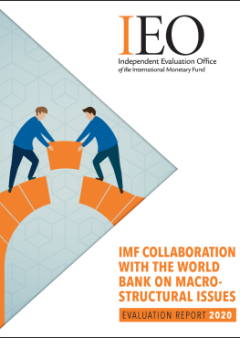
Member's Documents
IMF Collaboration with the World Bank on Macro-Structural Issues
Published by: Independent Evaluation Office of the International Monetary Fund
SDGs: SDG 13 - Climate Action, SDG 17 - Partnerships for the Goals
The evaluation found that: collaboration on these issues was broad but uneven; initial aspirations that the Fund would be able to systematically leverage Bank expertise proved over-optimistic; there were few examples of in-depth collaboration; and there were cases of mixed messages and failures to identify and exploit synergies.
The report suggested that the unevenness of Bank-Fund collaboration reflected a number of factors, including a cultural tendency towards self-reliance at the Fund, the challenges of working with another large institution (including aligning goals and timetables and finding access to the right people and information), and limited consideration of the gains for Bank staff to collaborate with the Fund in policy areas where they had already established considerable presence. Collaboration has been most effective in policy areas like debt and finance where there has been agreement on well-defined roles and tailored frameworks for working together.
It is clear from the evaluation that while collaboration can bring significant benefits to the quality and influence of Fund work, it is also difficult. Collaboration requires planning and concerted effort to be effective; it is not a panacea for extending the Fund’s ability to cover a widening range of issues at a time when resources are under strain.
The report made four broad recommendations to encourage a more strategic approach to ensure more effective collaboration work:
- Develop and agree with the World Bank on concrete frameworks for collaboration on those issues where Fund and Bank roles are complementary and where collaboration is judged to bring the greatest strategic returns.
- Seek to improve internal incentives for staff to collaborate with external partners.
- Improve access to and exchange of information and knowledge across the Fund and the Bank.
- Strengthen the Executive Board’s strategic role in facilitating and supporting external collaboration.
In discussing the report, Executive Directors emphasized the importance of ensuring effective collaboration as the Fund increasingly engages on a broad range of policy issues including those related to fostering a robust global economic recovery from the pandemic, and joined the Managing Director in broadly supporting the recommendations. Many Directors underscored that work on climate issues would be a strong candidate to develop a more tailored collaboration framework between the Fund and the Bank. Many Directors supported creating a high-level joint Fund-Bank committee to focus on longer-term strategic issues and help institutionalize collaboration. IMF management will work with staff to propose a follow-up implementation plan in coming months.
